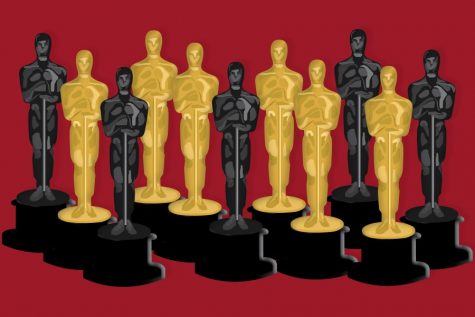Oscars watch 2019: still too white?
February 28, 2019

The following is a opinion column and does not reflect the views of The Tulane Hullabaloo.
Celebrating its 91st year, the Academy Awards were definitely not #OscarsSoWhite, but historically remarkable. The Academy distributed Awards on an even level, resulting in no dominant winner leaving the show, and no dominant group taking the spotlight. It was a year full of firsts for the Academy, beginning with the choice to broadcast a host-less show.
It was also not only a year of firsts but also a year of greater representation: Ruth E. Carter became the first African American woman to win for Best Costume Design, Hannah Beachler became the first African American to win Best Production Design, Asian American couple Jimmy Chin and Elizabeth Chai Vasarhelyi’s “Free Solo” won Best Documentary Feature, Mexican director Alfonso Cuarón’s triple win for the Netflix film “Roma” made him the first person to win an Oscar for Best Cinematography and Best Director, and Spike Lee left the Academy with his first Oscar for Best Adapted Screenplay for “BlacKkKlansman”. Let’s not forget about Lady Gaga and Bradley Cooper’s heart-captivating performance of “Shallow,” following which Gaga took the stage to receive the Oscar for Best Original Song, making it the first Oscar of her career.
But it was chemistry of Viggo Mortensen and Mahershala Ali portraying the relationship of Tony Vallelonga and Don Shirley in the film “Green Book” that took home the most important award of the night, Best Picture. Yet, having stirred up much conversation in racial politics, the success of the film and its story are viewed with many opposing opinions.
Despite the noteworthy night full of firsts in Hollywood and the propelling of change in the industry’s representation of minorities, many felt a setback in the triumph of “Green Book” because of the controversies behind the story. As Spike Lee described it, “The refs made a bad call.”
“Green Book” tells a true story about the relationship between a working-class, Italian American Tony Vallelonga (Viggo Mortensen) and a world-class, African American pianist Dr. Donald Shirley (Mahershala Ali). Shirley hires Vallelonga to chauffeur him on a concert tour of the Jim Crow South. The film refers to the guidebook, known as “The Negro Motorist Green Book,” that African Americans used to navigate black-accepting hotels and restaurants while traveling. The unlikely but charming forging of Shirley’s and Vallelonga’s friendship delves into their battle against the segregated society and the cruelty of racism during the 1960s.
Though the film highlights many important elements of American history such as overcoming obstacles of the segregation and oppression that Black Americans faced during the Jim Crow era, there is much controversy of whether this film truly contributes to the social progression of diminishing white supremacy. While the film celebrates a friendship, it also portrays Vallelonga as another white savior trope that Hollywood has perpetuated time and time again. Throughout the film, Vallelonga is seen saving Shirley from beatings of white racists in the South and hostile police encounters. The endearing bond formed between Shirley and Vallelonga is actually believed to be misportrayed and exaggerated, for Shirley’s family claims that real relationship between the two was really employee and employer. Viewers and critics found that its efforts in telling the history of society was almost too reversed, thus making it less worthy of the title in the eyes of progressive audiences.
There also was much backlash after the release of the film. In spite of the polarized opinions of “Green Book,” the film carries a message of overlooking the predispositions that society imposes on social groups. Whether or not Vallelonga and Shirley were actually as great of friends as the movie portrays them to be, their relationship in the film still embodies the understanding of each other’s differences and the hardships one may face due to oppression. In the political climate our society lives in, the depiction of marginalized groups in the media is crucial in the formation of future.
The Academy should not be tormented for one film’s controversial misrepresentation. In retrospect, I believe the Academy’s efforts of becoming less discriminatory were successful. I would relate this year’s distribution of awards to the seeds of an everything bagel. The ceremony championed greater numbers of evenly represented minority groups than in years past. Historical steps like these bring the film industry and society forward to change.






















Leave a Comment